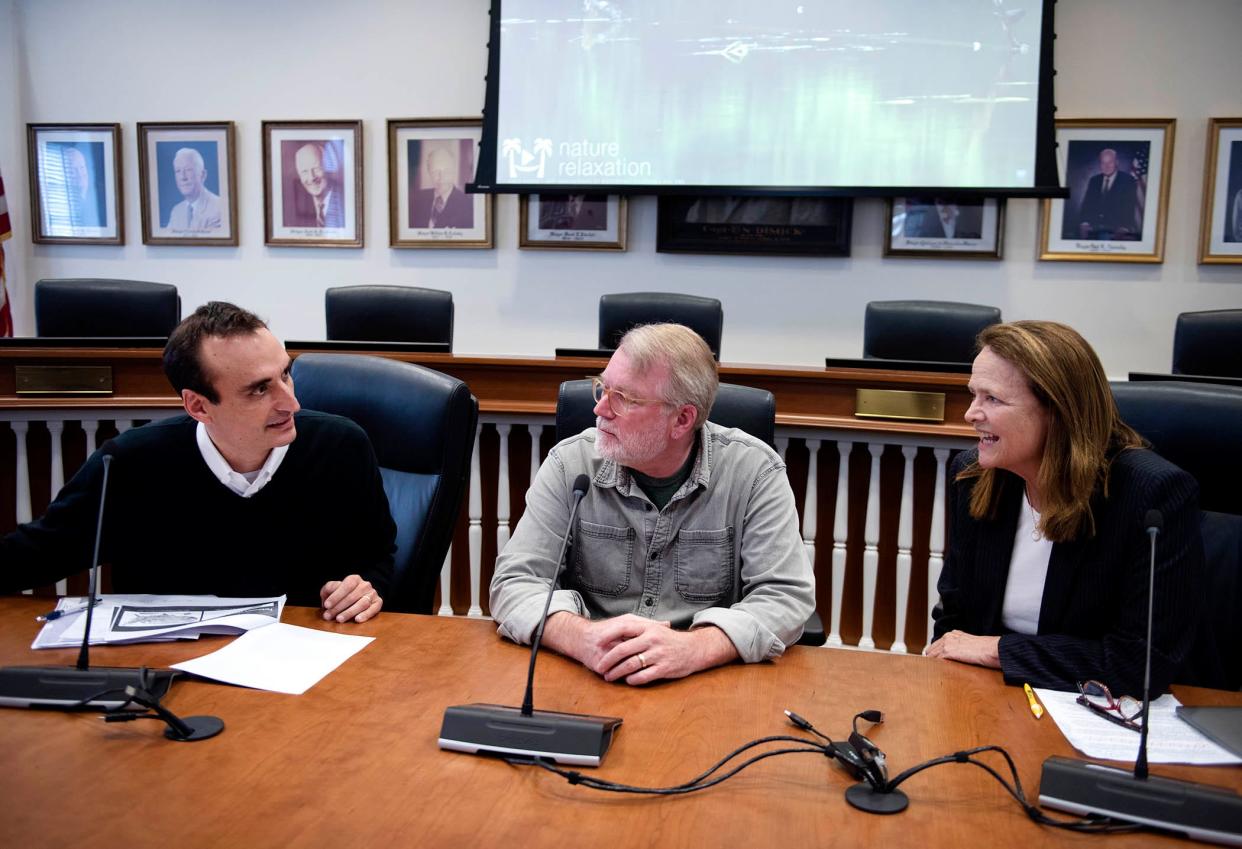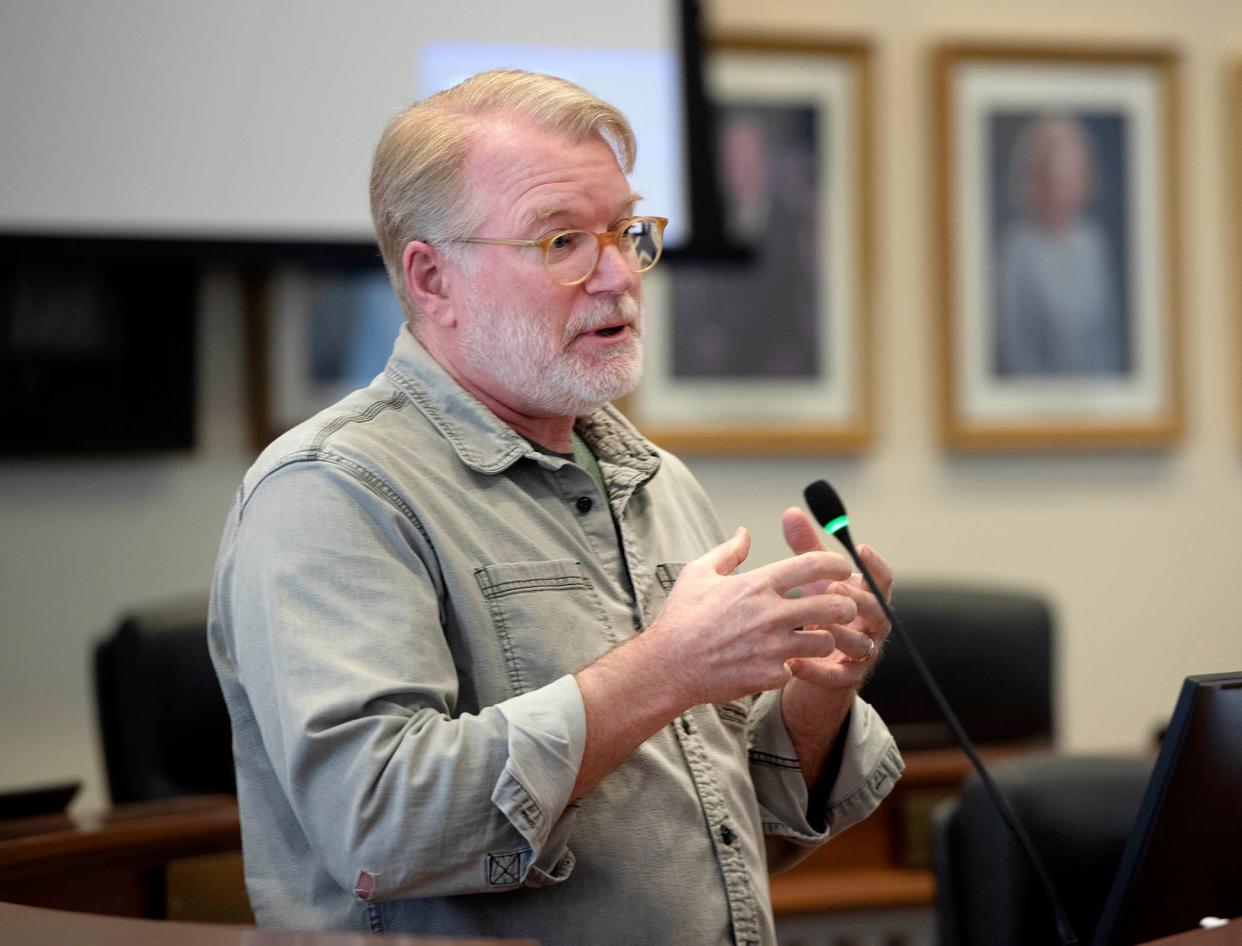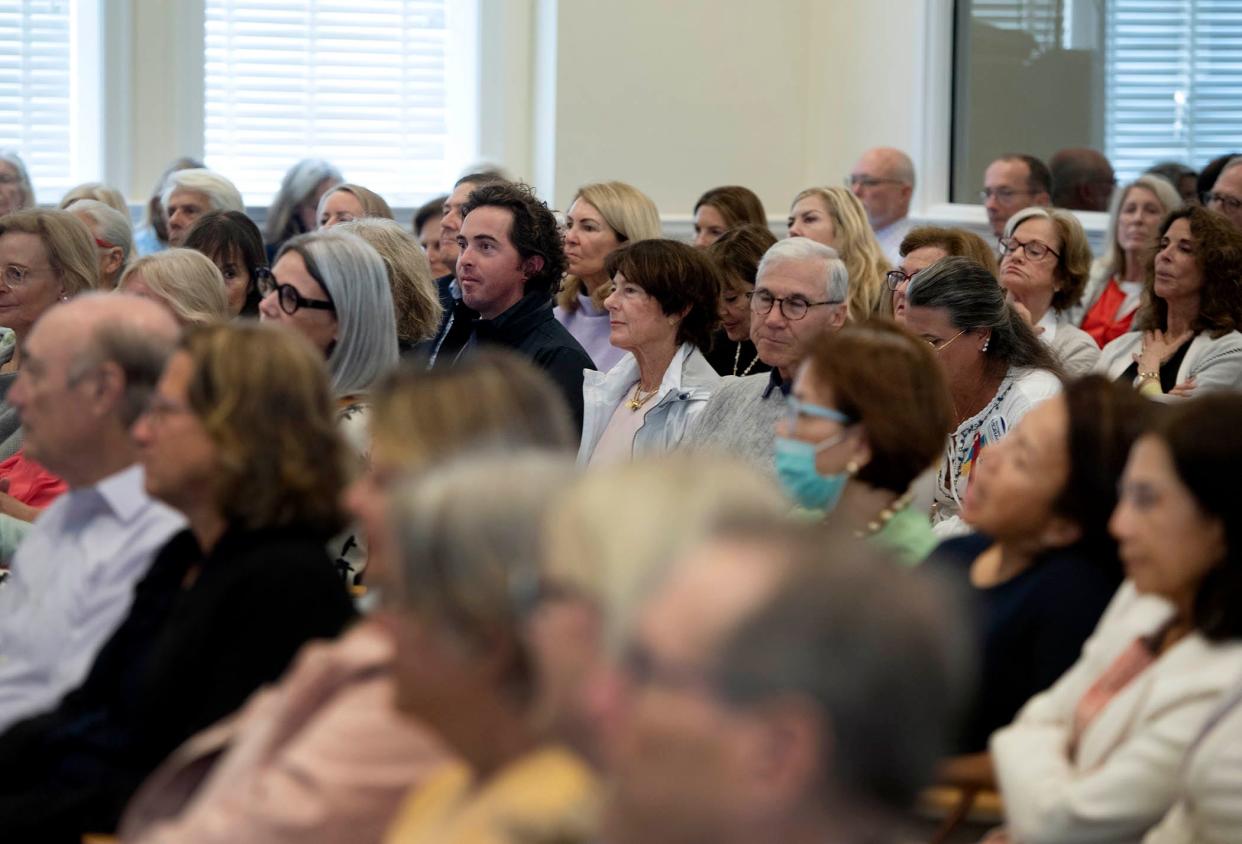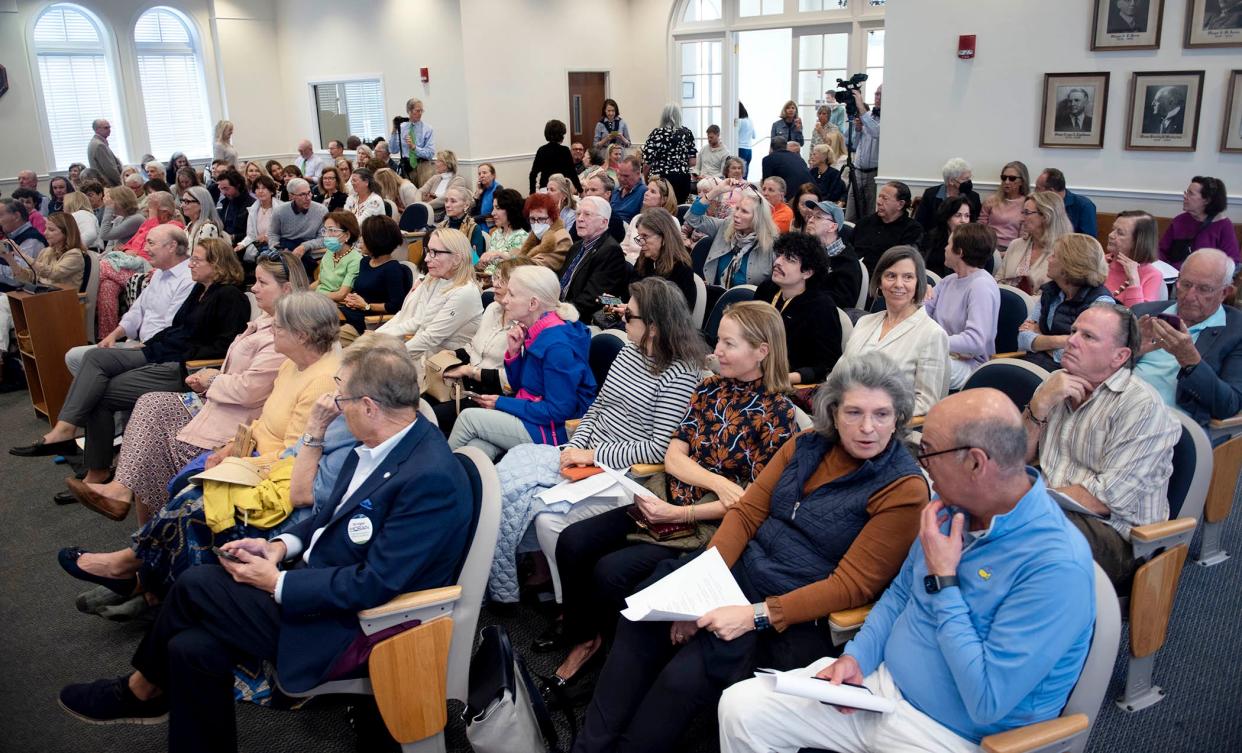Leading doctors warn of rising 'man-made diseases' during Palm Beach lecture
The mass use of pesticides and nonbiodegradable chemicals will have far-reaching negative effects to some of the most vulnerable demographics.
That’s according to a panel of expert doctors who spoke Monday at Palm Beach's Town Hall as part of the “Where have all the Songbirds Gone? III” seminar.
“Most of us don't have a choice about whether we're going to be exposed to these chemicals. We can reduce our exposure somewhat, but it's almost impossible to eliminate it,” said Dr. Bruce Lanphear, professor of health sciences at Simon Fraser University in Vancouver, British Columbia.
Joining Lanphear was Dr. Ray Dorsey, a professor of neurology at the University of Rochester, and moderator Katie Carpenter, a documentary filmmaker and Palm Beach resident.
The third in a series of seminars promoting a toxin-free Palm Beach, the panel, sponsored by the Palm Beach Civic Association, the Citizen's Association of Palm Beach, the Garden Club of Palm Beach and the town, gave a grim assessment of U.S. regulation against harmful pesticides, fertilizers and chemicals, including heavy metals such as mercury and lead.
Part of the issue, Lanphear said, is that U.S. scientists have historically been slow to accept the danger posed by chemicals already deemed nontoxic. He cited a 2015 Pew Research poll which found that 68% of scientist polled thought food grown with pesticides were safe, while 69% of the U.S. public considered it unsafe.
“In a way scientists have been indoctrinated to say that we have to have 10 or 20 studies, 10 or 20 studies with humans, before we declare something to be toxic,” Lanphear said, noting that it often takes less evidence for a chemical to be labeled initially as nontoxic.
“That no longer makes sense.”

Scientist: Rise in mental disorders diagnoses influenced by chemical exposure
This isn't the first time Lanphear has been at the forefront of regulating harmful chemicals. His studies examining the harmful effects of pesticides, lead and other toxic chemicals have long been used to inform regulators in Canada and the United States.
During his presentation, Lanphear shared statistics indicating that:
Mercury stemming from fish contaminated by pollution was found in 89% of children surveyed.
Organophosphate pesticides used to treat produce were found in over 80% of children.
Pentachlorophenol, known as PCP, a pesticide and disinfectant banned by the United States in the 1970s, was still found in all children surveyed.
Bisphenol A or BPA, a chemical used in plastic production, including water bottles, was found in 96% of children.
Polybrominated Diphenyl Ethers or PBDE, a flame retardant banned in 2004 that was used in a variety of products including textiles, cars and electronics, was found in 100% of children
He noted that even with the banning of PCP and PBDE, they will most likely “be with us for generations” due to their “persistent” nature.
As an example of the longevity of these toxic chemicals, he pointed to DDT, the insecticide that was banned in the 1970s following Rachel Carson’s seminal environmentalist work “Silent Spring.”
“When we started our study in 2003, we found that 80% of the women have measurable levels of DDE, a metabolite of DDT,” he said to the nearly full Town Hall. Those in attendance included Town Manager Kirk Blouin and Town Council Members Lew Crampton, Ted Cooney and Bobbie Lindsay, the latter of whom helped organize the event.

Moreover, while exposure rates for some of these chemicals, like lead or PBDE, have been reduced, recent studies have illuminated a correlation between lower levels of toxic exposure and mental-health disorders like ADHD, Lanphear said.
He also highlighted a 12-year-study published by the University of Cincinnati in 2022 that found that in utero exposure to PBDE correlated to an increased rate of anxiety symptoms in the children examined.
Lanphear believes the public’s mass exposure to these chemicals is a notable risk factor influencing the increasing the rates of mental disorders in younger generations, but one that has gone understudied.
Regarding pregnancy, he said, “The developing fetus lacks some of the enzymes that our body uses to detoxify."
Lanphear said young children are especially vulnerable because their bodies are creating cells faster, thus increasing the absorption rate of toxic chemicals.
In addition, young children eat, breathe and drink pound-for-pound more than any other age demographic, leading children to have comparatively higher rates of toxic exposure, he said.
Parkinson is a 'man-made disease,' scientist says
Dorsey spoke about the correlation between the history of industrialization and the rise of diseases like Parkinson's, Alzheimer's and cancer.
As an example, he noted Parkinson's rise since first being documented by English doctor James Parkinson, the disease's namesake.
"He (Parkinson) described six people with the condition that he said had not been described by medical literature; 200 years after he described six people with this disease, the Global Burden of Disease study estimates that there's 6 million," said Dorsey, whose work has been featured in news outlets including NPR, The Wall Street Journal and The New York Times.
Furthering his point, he highlighted the rising rate of cancer among people younger than 50.
"We're seeing a rise in cancer rates among people under 50, (where) we're seeing a huge decline in the rates of smoking," Dorsey said.

Where most assume genetic predisposition to be the culprit, Dorsey said the types of cancers leading the uptick, like prostate cancer, do not have a strong genetic connection, or if the genetic predisposition is there, it is often not enough to "cause the disease by itself."
Instead, Dorsey notes the impact toxic chemicals including the herbicide Paraquat, the cleaning chemical Trichloroethylene and air pollution as risk factors influencing the rate of these "man-made diseases."
Paraquat is one of the most used herbicides in the United States, but as Dorsey notes, it has been associated with a "150% increase risk of Parkinson's over a decade."
"Yet, last week for reasons that are unclear to me, the EPA gave a temporary reauthorization for this herbicide that's been banned in over 50 countries, including China," he said.
The second chemical Dorsey discussed was Trichloroethylene, or TCE, a multipurpose chemical that's still used as a dry cleaning agent, degreaser and a key ingredient in some refrigerants.
"It was associated with a 500% increase risk of Parkinson's," Dorsey said. "My colleague looked at World War II veterans … who either had hobby or occupational exposure to TCE, and they had a six-times-higher rate for developing Parkinson's disease. It is also known to cause cancer."
Moreover, due to the chemicals' quick evaporation rates and widespread use as a solvent for dry cleaners, "living near a dry cleaner, you can be inhaling this chemical and unsafe levels and never know it," he said.
He noted that though the EPA had proposed banning it last year, no action has been taken as of yet.
Speaking to the impact of air pollution, Dorsey said research shows "air pollution … is responsible for more disabilities than hypertension, and more disabilities than high levels of blood glucose."
Panel calls for greater government accountability and increased regulation to the private sector
So what can be done?
Lanphear recommends switching to an organic diet, saying studies have shown it can lead to a reduced level of pesticides. He also recommended buying food unpackaged, as to avoid any possible BPA's from the plastic packaging.
He also recommended avoiding cosmetics, including fingernail polish and lotions, though he recognizes that can be a challenge for some.
"This was really hard to convince my daughters," he said, eliciting chuckles.
Finally, regarding short-term changes, he said to avoid the use of pesticides, as even those sold over the counter can easily spread via runoff.
"Ultimately, we need to strengthen the way we manage chemicals at the state and federal level," said Lanphear, who co-founded Little Things Matter, an advocacy organization that serves as a educational hub regarding the latest research on the effects of child toxic chemical exposure.

Part of the solution, he said, must also be shifting medical research's focus from finding an "elusive cure" to one that invests in researching the risk factors so that the diseases can be prevented altogether.
"Medicine is great at mending if they have health insurance," said Lanphear in a prerecorded video he shared during the presentation. "But the real victory is like the elimination of polio. The reduction in motor vehicle deaths and the decline in lung cancer largely resulted from communitywide prevention programs."
Regarding state policy, he argued that the U.S Environmental Protection Agency could learn from the U.S. Food and Drug Administration.
"The way we evaluate drugs is much more rigorous," he said. "It's got its problems, but it's much more rigorous."
Dorsey highlighted the need to hold chemical manufacturers' accountable. He said they are guilty of spreading ignorance to the detrimental effects of these toxic chemicals.
He highlighted a series of investigative articles published in The Guardian which exposed that the Swiss-based chemical manufacturing company Syngenta had been aware of the mounting evidence of Paraquat's long-term health effects for decades.
"Wrongdoers need to be held accountable. When wrongdoers are not held accountable, they become emboldened and only do more wrong things," Dorsey said.
Diego Diaz Lasa is a journalist at the Palm Beach Daily News, part of the USA TODAY Florida Network. You can reach him at dlasa@pbdailynews.com. Help support our journalism. Subscribe today.
This article originally appeared on Palm Beach Daily News: Doctors warn of rising 'man-made diseases' during Palm Beach lecture
